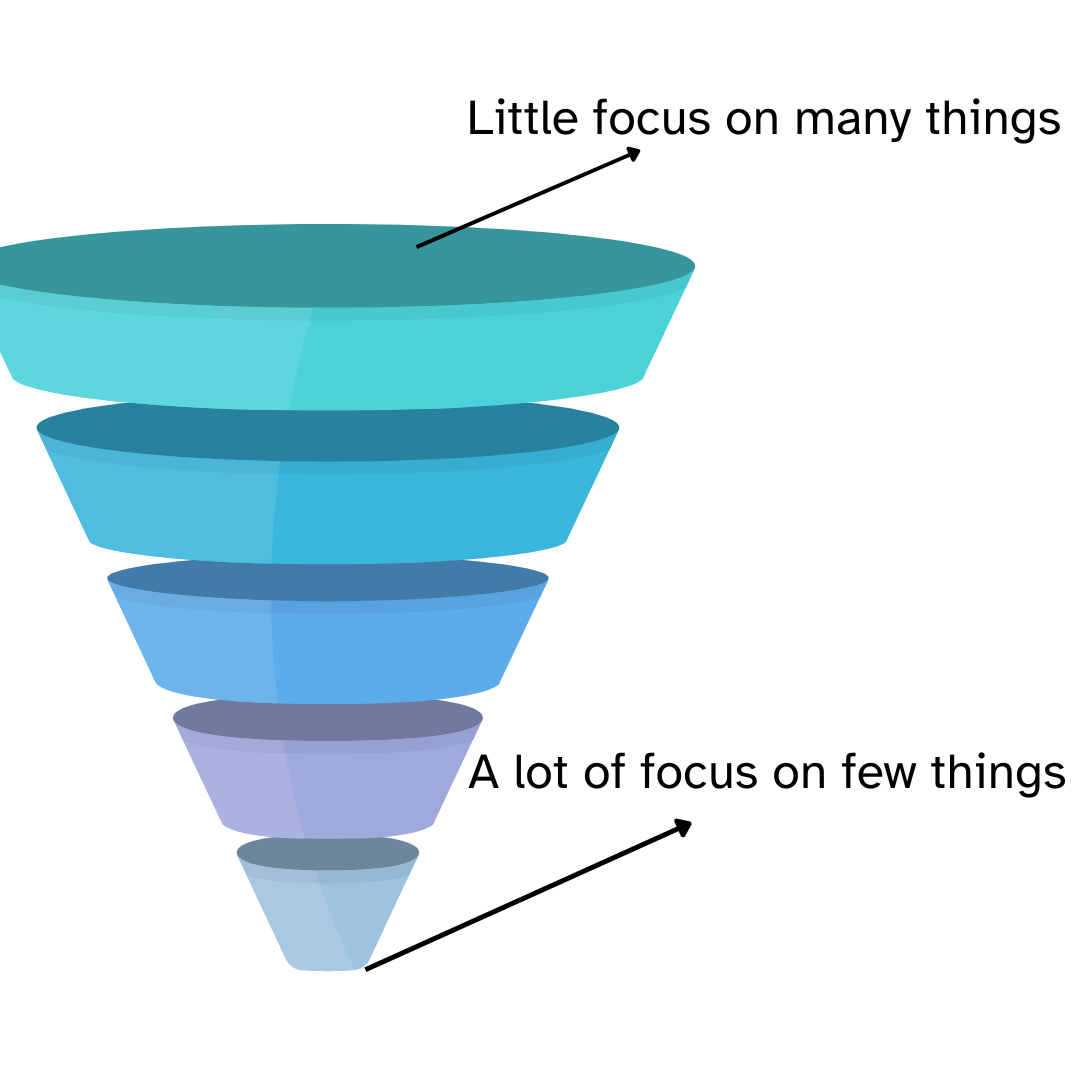The Dance of Focus: Exploring Attentional Energy
Aug 18, 2023
Our ability to focus is a precious resource in a world teeming with information and distractions. Much like a finite wellspring, attentional energy is a fundamental cognitive currency influencing how we navigate our daily lives effectively. As we move through life and the world, we simultaneously receive and create the world around us. What we spend our limited attentional energy on dramatically affects the life we experience. Learning the elements of attentional energy, we uncover a deeper understanding of its limits and the mechanisms that govern our ability to concentrate.
Levels of Focus
As a way to understand attentional energy, consider a funnel. The top part (in two-dimensional space) is up, and the pointed part is down. At the top, we have little focus on many things. As we move down the funnel, we become more focused using more attentional energy on fewer items. Sometimes, being at one end of the funnel is more beneficial.
In extremes, we might think of the top of the funnel as a narrative attentional space. Our attentional energy is spread so far and wide that it fills in many blanks. The bottom of the funnel might be called the experiential attentional space. This is where there is extreme focus to the point where one becomes only away from the current experience.
This concept is helpful to explain where your attentional energy is being spent and where it might be better set.

Elements of Attentional Energy
Selective Focus
The foundation of attentional energy lies in our ability to selectively focus on a single task or stimulus while tuning out irrelevant distractions. This element serves as a gatekeeper, allowing us to allocate our cognitive resources to what truly matters at any moment. Imagine trying to read a book while a television blares in the background – the struggle to concentrate results from divided attentional energy.
This is where we intentionally move our attentional energy spend from the top of the funnel towards the bottom.
Sustained Attention
Sustained attention is the capacity to maintain focus on a task or activity over an extended period. Think of it as a marathon for your mind – a steady stream of attentional energy directed towards a singular objective. While our brains are remarkably adaptive, even sustained attention has its limits, and fatigue can set in, diminishing our ability to concentrate effectively.
Task Switching
Transitioning between different tasks requires a unique form of attentional energy. The brain must disengage from one task, reallocate resources, and engage in a new task. While some individuals seem adept at rapid task switching, studies suggest this can incur a cognitive cost, reducing overall attentional efficiency.
Different tasks require different levels of attentional spend. So the more you switch, the more you move up and down the funnel spending attentional energy.
Divided Attention
Divided attention involves splitting our cognitive resources between multiple tasks simultaneously. This element of attentional energy is often put to the test in our hyper-connected world. Juggling multiple tasks can lead to diminished performance and a shallower understanding of each task's intricacies.
Limits of Attention
Understanding attentional energy would be incomplete without acknowledging its limitations. These constraints shape our cognitive experiences and influence how we allocate our focus.
Cognitive Load
Every task we undertake carries a cognitive load – the mental effort required to complete it. We risk mental exhaustion as we push our attentional energy towards demanding tasks. The more intricate or unfamiliar a task is, the more attentional energy it consumes, leaving less for other endeavors.
Limited Capacity
Our brains possess a finite capacity for attentional energy. Just as a glass can only hold so much water, our minds have boundaries regarding focus. Attempting to exceed these limits can result in decreased performance, reduced memory retention, and stress.
Multitasking Myth
Despite the allure of multitasking, research has repeatedly shown that our attentional energy is best utilized when dedicated to a single task. Attempting to divide our focus across various activities can lead to reduced efficiency, errors, and overall shallow information processing. Using the funnel analogy, we are expending energy on many items at once. More energy is spent here and it is not efficient in its expense. As we move up and down the funnel towards focus and away, we are spending limited energy.
Digital Distractions
The digital age has ushered in a new era of attentional challenges. The constant stream of notifications, messages, and online content can erode our ability to sustain attention. Prolonged exposure to digital distractions can lead to attentional fatigue, making it harder to engage deeply in tasks that require focused energy.
Conclusion
Attentional energy is the invisible force that drives our ability to engage with the world around us. Its elements – selective focus, sustained attention, task switching, and divided attention – shape our cognitive landscape and determine how effectively we process information. While our brains are remarkably adaptable, understanding the limits of our attentional energy is crucial for optimizing our focus and enhancing our cognitive well-being.
As we navigate a fast-paced world filled with constant demands for our attention, recognizing the delicate balance between allocating attentional energy and respecting its limitations is essential. By nurturing our capacity for focus and minimizing distractions, we can unlock our true potential and embark on a journey toward a more mindful and productive existence.
Get Yours Now!
Discover the true meaning of success with our exclusive guide: Defining Your Success Worksheet.
Dive into thought-provoking questions designed to uncover your unique path to fulfillment. Don't chase shadows; define and achieve a success that resonates with your core values and aspirations.
Subscribe now and start forging your journey to success with clarity and purpose.
We hate SPAM. We will never sell your information, for any reason.

